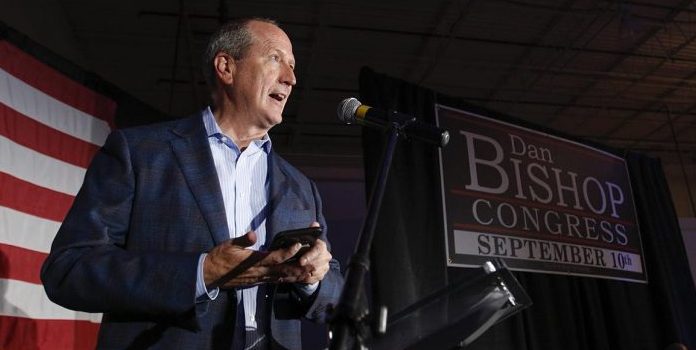(Ken Silva, Headline USA) After Rep. Kevin McCarthy finally secured the House speakership on Friday, Freedom Caucus members announced that they will be empaneling a “Church-style committee” to investigate U.S. intelligence agencies.
“With the rules agreement we negotiated, we will have a powerful Church-style committee to go after the weaponization of the federal government — the FBI, DOJ, DHS, and all the rest,” Rep. Dan Bishop said on Twitter. “This is a victory for the Constitutional rights of all Americans.”
The calls from Bishop and other Freedom Caucus members is in reference to the 1970s Church Committee, formally known as the United States Senate Select Committee to Study Governmental Operations with Respect to Intelligence Activities.
Headed by then-Senator Frank Church, a Democrat, the committee was formed in January 1975, on the heels of a New York Times expose on the CIA conducting illegal domestic spying operations.
The Church Committee unearthed numerous instances of wrongdoing by U.S. federal law enforcement and intelligence agencies.
Church Committee revelations included Operation MKULTRA, the CIA’s human experimentation on mind control that entailed drugging and torturing unwitting citizens; COINTELPRO, FBI surveillance and infiltration of American political and civil-rights organizations; and Operation Mockingbird, which entailed the CIA embedding assets in domestic and foreign news outlets.
Nearly 50 years later, legislators are again looking to investigate the CIA, FBI, and other federal agencies.
On Tuesday, the House is scheduled to vote on a resolution to create a “Select Committee on the Weaponization of the Federal Government.”
As per the resolution, the committee will probe federal investigations of U.S. citizens — including ongoing criminal investigations — as well as how federal agencies interact with private sector entities to take action against Americans. The committee will also probe how federal agencies collect information on Americans, as well as any other activities that affect U.S. civil liberties.
Based on comments made so far by Freedom Caucus members, the issues that will initially be investigated include the FBI working with tech companies to censor dissident voices, the FBI treating parents protesting at school board meetings as domestic terrorists, and the bureau’s handling of the Hunter Biden laptop scandal.
Others have called for Republicans to investigate the FBI’s use of informants in the Jan. 6, 2021 Capitol Hill protests.
When the resolution was announced Friday, Democrats and other critics were quick to blast the planned committee as a tactic to undermine active investigations into Jan. 6 and Donald Trump’s handling of classified documents.
Democrat Rep. Jerry Nadler told the New York Times that the committee would be “fueled by conspiracy theories and slated to be run by the most extreme members of the MAGA caucus.” By contrast, Nadler said the 1970s Church Committee was “a serious and bipartisan attempt to reform the conduct of the intelligence community, based on hard and verifiable evidence.”
However, Nadler is wrong to suggest that the Church Committee wasn’t politically charged.
Seymour Hersh, the Pulitzer Prize-winning journalist whose reporting helped prompt the Church Committee, wrote in his autobiography, Reporter: A Memoir, about some of the political infighting that took place during the first congressional investigation into U.S. security agencies. According to Hersh, the Democrat-controlled Church Committee shied away from investigating John F. Kennedy and his brother Bobby’s role in plotting multiple assassination attempts against Cuban Dictator Fidel Castro.
“It was a classic conflict of interest: An all-out inquiry into the Kennedy brothers’ wrongdoing in the early 1960s would cost him vital Kennedy family financial and political support in 1976. So Frank Church trimmed, Hersh wrote.
“Church’s waffling as new details of Kennedy’s recklessness poured forth ended any chance, slim as it was, of significant cooperation with the Republicans on the committee.”
Ken Silva is a staff writer at Headline USA. Follow him at twitter.com/jd_cashless.

